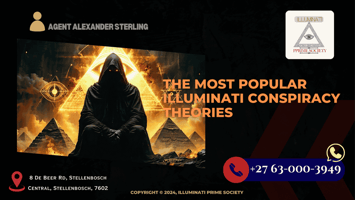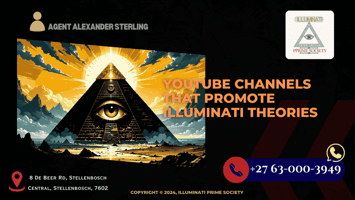In the era of viral content and social media, the enigmatic world of the Illuminati has infiltrated...
Illuminati Social Media: How Conspiracy Theories Spread Online
Unravel the mystery of how Illuminati conspiracy theories gain traction on social media platforms and influence public perception.
To guide you deeper into the Illuminati ecosystem, talk to us:
-
“Ready to share your success story?” → Contact Form
-
“Learn directly from Agent Alexander Sterling” → Agent’s Blog
-
“Speak privately about your path” → Talk to Agent on WhatsApp ✅
- “Explore more member journeys” → /illuminati-member-testimonials
- "Illuminati in Modern Culture" → /illuminati-modern-culture
The Origins of Illuminati Conspiracy Theories
The Illuminati conspiracy theories have their roots in the 18th century when the Bavarian Illuminati, a secret society, was founded by Adam Weishaupt. This group's original mission was to promote Enlightenment ideals and oppose religious and state oppression. Over time, the group's secretive nature fueled speculation and fear, leading to its association with various conspiracy theories.
The modern resurgence of Illuminati conspiracy theories can be traced back to the mid-20th century. Books like 'The Illuminatus! Trilogy' by Robert Shea and Robert Anton Wilson, and the proliferation of internet forums in the late 1990s and early 2000s, provided fertile ground for these theories to evolve and spread. Today, the term 'Illuminati' is often used to describe an alleged global elite that manipulates world events.
The Role of Social Media Algorithms in Spreading Conspiracies
Social media platforms employ algorithms designed to maximize user engagement by prioritizing content that is likely to generate interaction. Unfortunately, this often includes sensational and conspiratorial content. As users engage with such posts, the algorithms amplify their reach, leading to a wider dissemination of conspiracy theories.
Moreover, these algorithms create echo chambers where users are predominantly exposed to content that aligns with their existing beliefs. This reinforcement of preconceived notions makes it easier for conspiracy theories to gain traction and become more deeply ingrained in public consciousness.
Psychological Factors That Make Conspiracy Theories Appealing
Several psychological factors contribute to the appeal of conspiracy theories. One such factor is cognitive dissonance, where individuals seek explanations for distressing or confusing events. Conspiracy theories offer a sense of control and understanding by providing a clear, albeit false, narrative.
To guide you deeper into the Illuminati ecosystem, talk to us:
-
“Ready to share your success story?” → Contact Form
-
“Learn directly from Agent Alexander Sterling” → Agent’s Blog
-
“Speak privately about your path” → Talk to Agent on WhatsApp ✅
- “Explore more member journeys” → /illuminati-member-testimonials
- "Illuminati in Modern Culture" → /illuminati-modern-culture
Additionally, social identity plays a crucial role. Being part of a group that 'knows the truth' can provide a sense of belonging and superiority. This group identity is further strengthened by the distrust of mainstream media and official narratives, creating a self-reinforcing cycle.
Case Studies: Viral Illuminati Claims on Different Platforms
YouTube has been a significant platform for the spread of Illuminati conspiracy theories. Videos claiming to expose Illuminati symbols in music videos and political speeches often garner millions of views, creating viral sensations that further perpetuate these myths.
On Twitter, hashtags like #Illuminati and trending topics related to alleged Illuminati activities spread rapidly due to the platform's real-time nature. Memes and short-form content on platforms like Instagram and TikTok also play a role in making these theories more accessible and appealing to younger audiences.
Combating Misinformation: Strategies and Challenges
Combating misinformation requires a multifaceted approach. Social media companies are increasingly implementing fact-checking mechanisms and flagging false information. However, these measures are often met with resistance from users who view them as censorship.
Education is another critical strategy. Teaching critical thinking skills and media literacy can help individuals discern credible information from conspiracy theories. Additionally, fostering open dialogue and encouraging skepticism without cynicism can create a more informed and resilient public.
.png?width=100&height=100&name=Illuminati%20Prime%20Society%20Logo%20(1).png)

